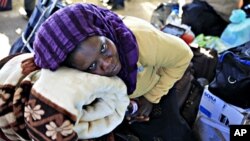The U.N. refugee agency says it is alarmed by reports of increasing violence and discrimination against sub-Saharan Africans caught up in Libya's conflict. The UNHCR says these accounts are coming from both eastern and western parts of the country.
The U.N. refugee agency says the situation in Libya is becoming increasingly dangerous for sub-Saharan Africans. The UNHCR is appealing to all parties to recognize African refugees and migrants are very vulnerable and in need of protection.
The agency says many Africans in Libya are fearful. It says they are being harassed and threatened by Libyans who believe they are mercenaries hired by Libyan leader Moammar Gadhafi to fight the opposition.
Spokesman Adrian Edwards says that on Monday, UNHCR staff at the Egyptian border interviewed a group of Sudanese who arrived from eastern Libya. He says the Sudanese recount how armed Libyans went from door to door, forcing sub-Saharan Africans to leave.
“In one instance, a 12-year old Sudanese girl was said to have been raped,” Edwards said. “They reported that many people had had their documents confiscated or destroyed. We have heard similar accounts from a group of Chadians who fled Benghazi, Al Bayda and Brega in the last few days.”
The UNHCR says there are hundreds of thousands of African migrant workers in Libya. Many have been there for years. Edwards says the UNHCR is worried about their welfare because staff increasingly is hearing alarming accounts of their treatment.
"People from this group feel they have been hunted, that they are under suspicion,” Edwards added. “We do not, as I say, have an organized way of assessing their situation inside the country. We are aware of those leaving the country. In many instances, they are leaving members of their families behind simply because they are afraid to move. So, it is an increasingly dramatic situation.”
Edwards says many of the Africans who have made it to the Egyptian or Tunisian borders get stuck on the Libyan side. He says border officials may not allow them to cross because the migrants do not have the proper papers.
He explains Africans and people of other nationalities who come to Libya to work often have their passports and other papers confiscated by their employers or others. He says the migrant workers run into difficulties at the border crossing if these important documents have not been returned to them.
UN Concerned About Sub-Saharan Africans in Libya
- By Lisa Schlein




